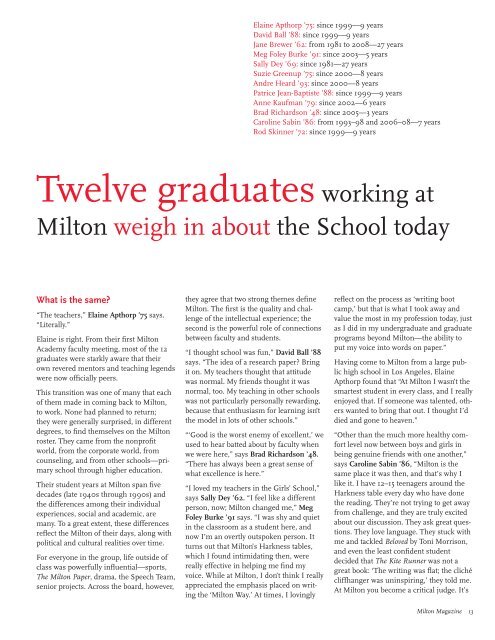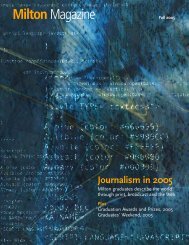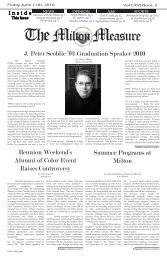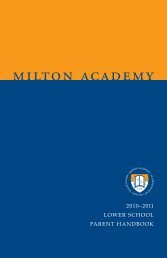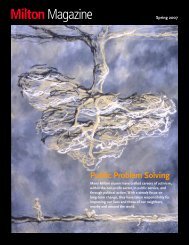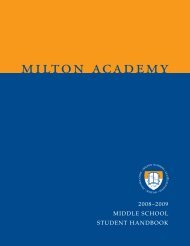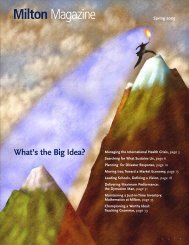Milton Magazine - Milton Academy
Milton Magazine - Milton Academy
Milton Magazine - Milton Academy
- No tags were found...
You also want an ePaper? Increase the reach of your titles
YUMPU automatically turns print PDFs into web optimized ePapers that Google loves.
Elaine Apthorp ’75: since 1999—9 yearsDavid Ball ’88: since 1999—9 yearsJane Brewer ’62: from 1981 to 2008—27 yearsMeg Foley Burke ’91: since 2003—5 yearsSally Dey ’69: since 1981—27 yearsSuzie Greenup ’75: since 2000—8 yearsAndre Heard ’93: since 2000—8 yearsPatrice Jean-Baptiste ’88: since 1999—9 yearsAnne Kaufman ’79: since 2002—6 yearsBrad Richardson ’48: since 2005—3 yearsCaroline Sabin ’86: from 1993–98 and 2006–08—7 yearsRod Skinner ’72: since 1999—9 yearsTwelve graduates working at<strong>Milton</strong> weigh in about the School todayWhat is the same?“The teachers,” Elaine Apthorp ’75 says.“Literally.”Elaine is right. From their first <strong>Milton</strong><strong>Academy</strong> faculty meeting, most of the 12graduates were starkly aware that theirown revered mentors and teaching legendswere now officially peers.This transition was one of many that eachof them made in coming back to <strong>Milton</strong>,to work. None had planned to return;they were generally surprised, in differentdegrees, to find themselves on the <strong>Milton</strong>roster. They came from the nonprofitworld, from the corporate world, fromcounseling, and from other schools—primaryschool through higher education.Their student years at <strong>Milton</strong> span fivedecades (late 1940s through 1990s) andthe differences among their individualexperiences, social and academic, aremany. To a great extent, these differencesreflect the <strong>Milton</strong> of their days, along withpolitical and cultural realities over time.For everyone in the group, life outside ofclass was powerfully influential—sports,The <strong>Milton</strong> Paper, drama, the Speech Team,senior projects. Across the board, however,they agree that two strong themes define<strong>Milton</strong>. The first is the quality and challengeof the intellectual experience; thesecond is the powerful role of connectionsbetween faculty and students.“I thought school was fun,” David Ball ’88says. “The idea of a research paper? Bringit on. My teachers thought that attitudewas normal. My friends thought it wasnormal, too. My teaching in other schoolswas not particularly personally rewarding,because that enthusiasm for learning isn’tthe model in lots of other schools.”“‘Good is the worst enemy of excellent,’ weused to hear batted about by faculty whenwe were here,” says Brad Richardson ’48.“There has always been a great sense ofwhat excellence is here.”“I loved my teachers in the Girls’ School,”says Sally Dey ’62. “I feel like a differentperson, now; <strong>Milton</strong> changed me,” MegFoley Burke ’91 says. “I was shy and quietin the classroom as a student here, andnow I’m an overtly outspoken person. Itturns out that <strong>Milton</strong>’s Harkness tables,which I found intimidating then, werereally effective in helping me find myvoice. While at <strong>Milton</strong>, I don’t think I reallyappreciated the emphasis placed on writingthe ‘<strong>Milton</strong> Way.’ At times, I lovinglyreflect on the process as ‘writing bootcamp,’ but that is what I took away andvalue the most in my profession today, justas I did in my undergraduate and graduateprograms beyond <strong>Milton</strong>—the ability toput my voice into words on paper.”Having come to <strong>Milton</strong> from a large publichigh school in Los Angeles, ElaineApthorp found that “At <strong>Milton</strong> I wasn’t thesmartest student in every class, and I reallyenjoyed that. If someone was talented, otherswanted to bring that out. I thought I’ddied and gone to heaven.”“Other than the much more healthy comfortlevel now between boys and girls inbeing genuine friends with one another,”says Caroline Sabin ’86, “<strong>Milton</strong> is thesame place it was then, and that’s why Ilike it. I have 12–15 teenagers around theHarkness table every day who have donethe reading. They’re not trying to get awayfrom challenge, and they are truly excitedabout our discussion. They ask great questions.They love language. They stuck withme and tackled Beloved by Toni Morrison,and even the least confident studentdecided that The Kite Runner was not agreat book: ‘The writing was flat; the clichécliffhanger was uninspiring,’ they told me.At <strong>Milton</strong> you become a critical judge. It’s<strong>Milton</strong> <strong>Magazine</strong> 13


